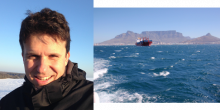Effects of human mediated transport of species on the global redistribution of biota: Ecological and evolutionary consequences

MARC RIUS
Centre for Advanced Studies of Blanes, Spain
Link to seminar: https://umontpellier-fr.zoom.us/webinar/register/WN_OyMIdvsPT-SFu5wzk9b-Mg
Summary
Biodiversity patterns are continuously reshaped by human activities. A key example of such activities is the intentional and unintentional transport by humans of species away from their native ranges. Genotypes that have evolved in isolation are now found in sympatry, resulting in an unprecedented increase of ecological interactions of species / genotypes that have not co-evolved. In addition, the ever-increasing transport of non-indigenous species is fundamentally altering evolutionary trajectories and creating novel ecological communities of short evolutionary age. Despite growing recognition of the wide-spread presence of such alterations, we still have a limited understanding of the nature and magnitude of their ecological and evolutionary consequences. My talk will synthesize recent research findings showing how human mediated transport of species has reshaped gene flow patterns around the world and altered geographic barriers that were previously impenetra-ble. The suite of genomic tools now available has considerably enhanced our ability to unravel the ecological and evolution-ary consequences of a mounting global redistribution of biota.
Recent publications:
1 Hudson J, Bourne SD, Seebens, H, Chapman MA, Rius M (2022) The reconstruction of invasion histories with genomic data in light of differing levels of anthropogenic transport. Philosophical Transactions of the Royal Society B, 377: 20210023. doi.org/10.1098/rstb.2021.0023
2 Hudson J, Castilla JC, Teske PR, Beheregaray LB, Haigh ID, McQuaid CD, Rius M (2021) Genomics-informed models reveal extensive stretches of coastline under threat by an ecologi-cally dominant invasive species. Proceedings of the National Academy of Sciences 118: e2022169118. doi.org/10.1073/pnas.2022169118
3 Holman LE, De Bruyn M, Creer S, Carvalho G, Robidart J, Rius M (2021) Animals, protists and bacteria share marine biogeographic patterns. Nature Ecology & Evolution 5: 738-746. doi.org/10.1038/s41559-021-01439-7
Watch previous seminars on our YouTube channel: https://www.youtube.com/channel/UCrX4IsZ8WIFcDa0ZmC7rcQg
Contact du Comité SEEM: seem@services.cnrs.fr Contact du Labex CEMEB: cemeb-gestion@umontpellier.fr


